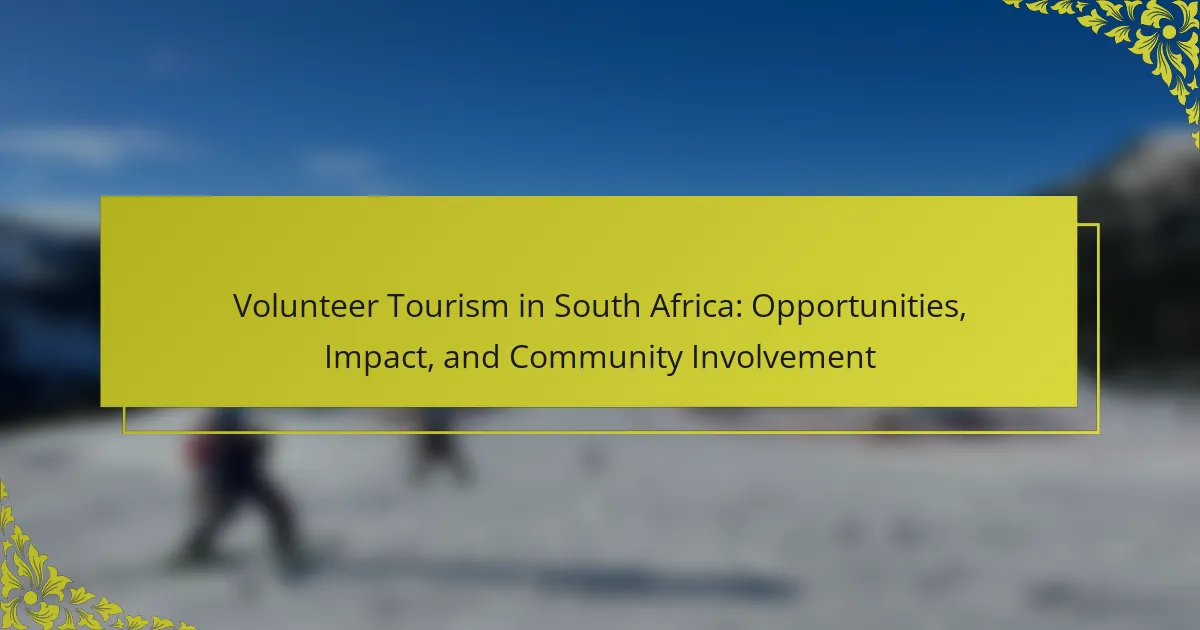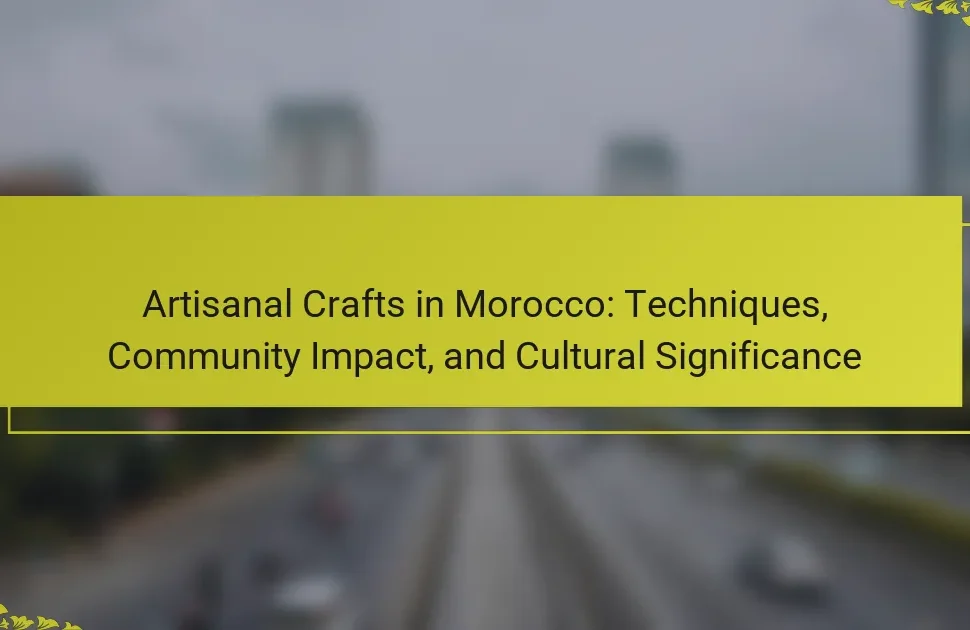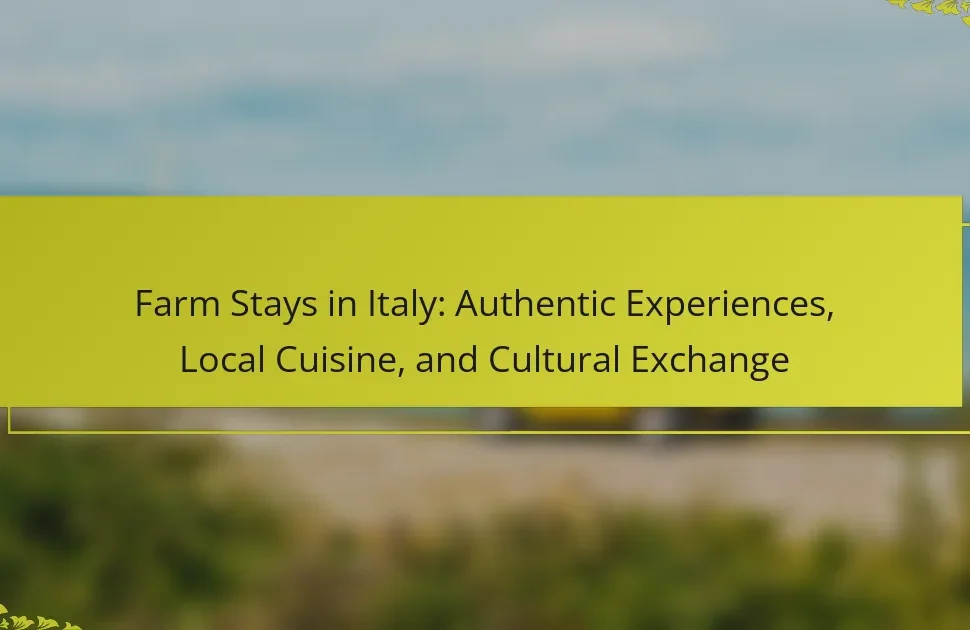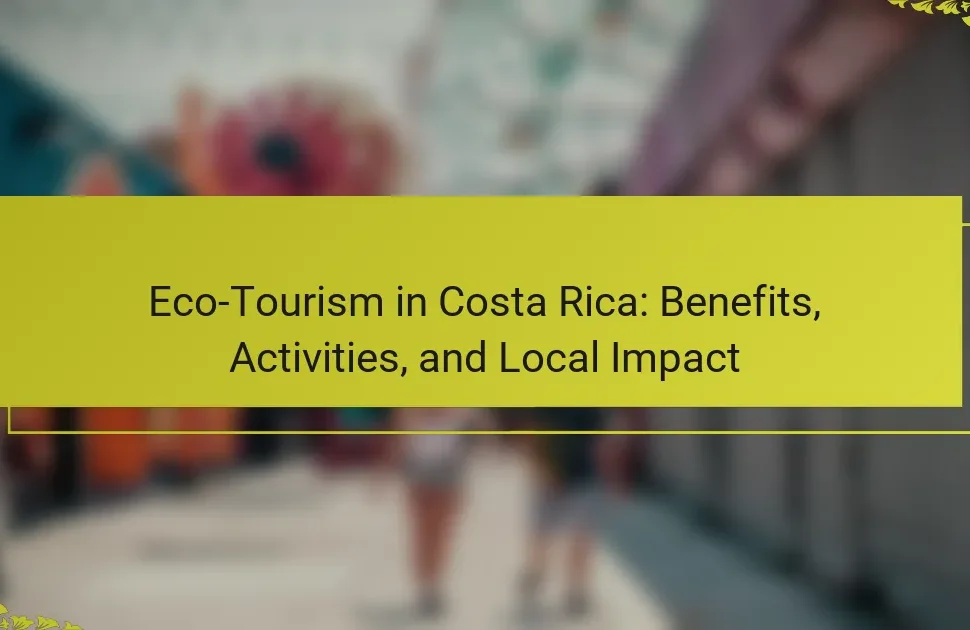Volunteer tourism in South Africa presents opportunities for personal growth and community impact. Participants engage in wildlife conservation, educational initiatives, and community development projects. This involvement fosters economic growth and cultural exchange while addressing local needs. Organizations play a vital role in connecting volunteers with communities, ensuring sustainable and meaningful contributions.
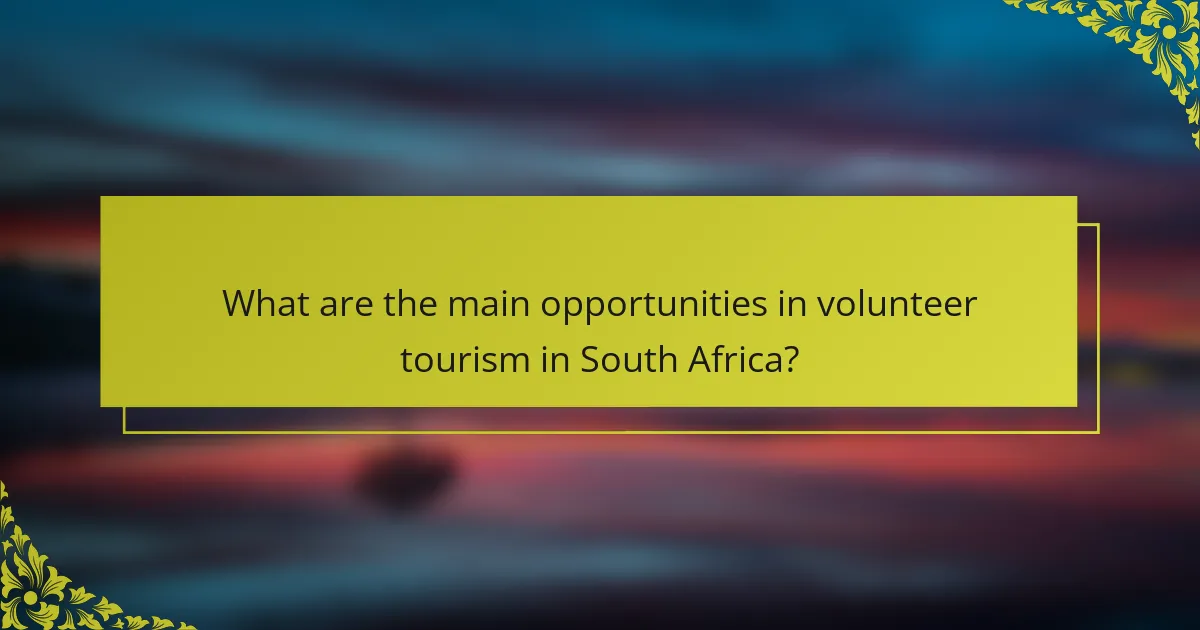
What are the main opportunities in volunteer tourism in South Africa?
Volunteer tourism in South Africa offers diverse opportunities that benefit both volunteers and local communities. These include wildlife conservation projects, community development initiatives, and educational programs. Volunteers can engage in hands-on activities, such as assisting in animal rehabilitation or supporting local schools. As a result, participants gain valuable experience while contributing to meaningful change. The unique cultural landscape of South Africa enhances the volunteer experience, making it a popular choice for those seeking impactful travel.
How do local communities benefit from volunteer tourism?
Local communities benefit from volunteer tourism through economic support, skill development, and enhanced social cohesion. Volunteer projects often provide essential resources, such as funding for local initiatives and infrastructure improvements. Participants share knowledge and skills, empowering residents and fostering self-sufficiency. Additionally, volunteer tourism encourages cultural exchange and strengthens community bonds, leading to a more resilient social fabric.
What are the most popular volunteer projects available?
Popular volunteer projects in South Africa include wildlife conservation, community development, and education initiatives. These projects offer unique opportunities for impactful engagement.
Wildlife conservation projects focus on protecting endangered species and their habitats. Community development initiatives aim to improve living conditions and provide essential services. Education projects often involve teaching or mentoring local youth, fostering skills for their future.
Participants can expect to gain enriching experiences while contributing positively to local communities.
Which skills are most valued in volunteer tourism?
The most valued skills in volunteer tourism include cultural sensitivity, adaptability, teamwork, and communication. These skills enhance the effectiveness of volunteers in diverse environments, fostering positive community interactions.
Cultural sensitivity is crucial for understanding local customs and building trust. Adaptability allows volunteers to navigate unexpected challenges and adjust to different cultural contexts. Teamwork enhances collaboration among volunteers, ensuring successful project outcomes. Strong communication skills facilitate clear exchanges with local communities, promoting mutual understanding and respect.
In South Africa, these skills significantly impact community involvement and project success, contributing to sustainable development and positive social change.
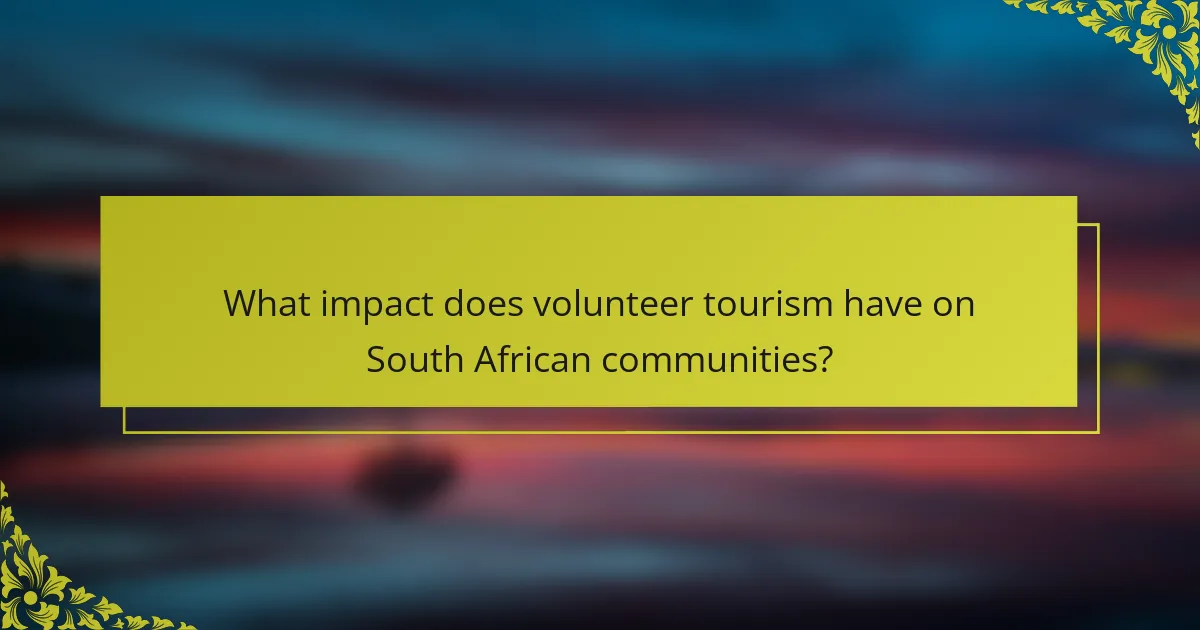
What impact does volunteer tourism have on South African communities?
Volunteer tourism positively impacts South African communities by fostering economic growth, enhancing skills, and promoting cultural exchange. It generates income through local businesses and provides essential services where resources are limited. Volunteers often engage in education, conservation, and healthcare initiatives, directly benefiting community development. Additionally, the cultural interactions help build mutual understanding and respect, enriching both volunteers and locals.
How does volunteer tourism contribute to sustainable development?
Volunteer tourism significantly contributes to sustainable development by fostering community empowerment and environmental conservation. Participants engage in projects that address local needs, such as education and wildlife preservation. This involvement enhances social cohesion and promotes cultural exchange. Additionally, volunteer tourism generates economic benefits, creating jobs and supporting local businesses. By prioritizing community-driven initiatives, it aligns with sustainable development goals, ensuring long-term impact and resilience.
What are the economic impacts of volunteer tourism on local businesses?
Volunteer tourism positively impacts local businesses by increasing revenue and fostering community engagement. This form of travel introduces volunteers to local markets, leading to higher sales for small enterprises. For instance, accommodations, restaurants, and local artisans often experience a surge in demand during volunteer tourism seasons.
Moreover, volunteer projects often require supplies and services from local providers, further stimulating the economy. The influx of tourists can create job opportunities, enhancing community livelihoods. As a result, local businesses gain visibility and can establish long-term relationships with returning volunteers.
In South Africa, volunteer tourism can significantly contribute to sustainable economic development. By integrating volunteer efforts with local business needs, communities can achieve both social and economic benefits. This symbiotic relationship promotes a healthier local economy while enriching the volunteer experience.
How do volunteer programs address social challenges?
Volunteer programs effectively address social challenges by fostering community engagement and creating sustainable impact. In South Africa, volunteer tourism enhances local development through skills transfer and resource support. These programs often focus on education, conservation, and healthcare, addressing critical needs in underserved areas. As a result, they empower communities and promote social cohesion while providing volunteers with meaningful experiences.
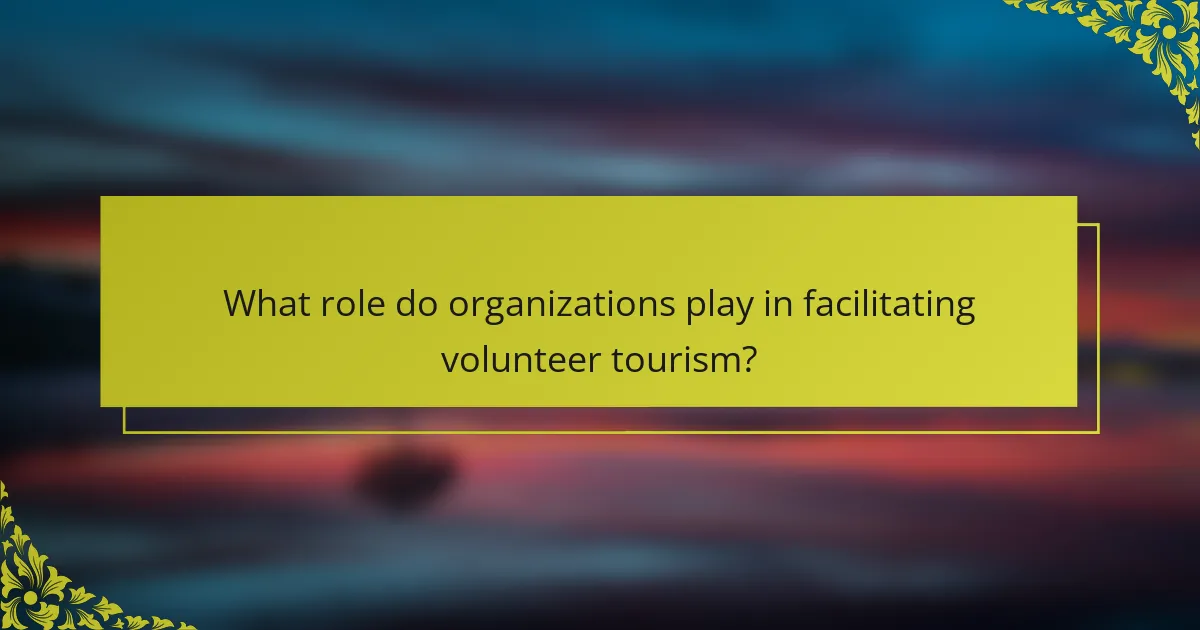
What role do organizations play in facilitating volunteer tourism?
Organizations play a crucial role in facilitating volunteer tourism by providing structure and support for initiatives. They connect volunteers with local communities, ensuring projects align with community needs. By offering training and resources, organizations enhance volunteer impact and sustainability. Furthermore, they foster partnerships that promote cultural exchange and mutual understanding. This collaborative approach maximizes benefits for both volunteers and host communities, creating lasting positive change.
Which organizations are leading in volunteer tourism initiatives?
Organizations leading in volunteer tourism initiatives in South Africa include Projects Abroad, African Impact, and GVI. These organizations focus on conservation, community development, and education. They provide structured programs that connect volunteers with local communities, enhancing social impact. For example, African Impact engages in wildlife conservation and local empowerment projects, fostering sustainable tourism practices.
How do organizations ensure ethical practices in volunteer tourism?
Organizations ensure ethical practices in volunteer tourism by implementing strict guidelines, fostering community partnerships, and prioritizing transparency. They conduct thorough assessments to identify community needs, ensuring that volunteer efforts align with local priorities. Training programs for volunteers emphasize cultural sensitivity and ethical engagement. Regular evaluations measure the impact of volunteer projects on communities, promoting accountability. By involving local stakeholders in decision-making, organizations enhance the relevance and sustainability of their initiatives.
What partnerships exist between local communities and volunteer organizations?
Local communities in South Africa partner with volunteer organizations to enhance social development and conservation efforts. These collaborations often focus on education, wildlife preservation, and infrastructure improvement. For example, volunteer programs may support local schools by providing resources and mentorship. Additionally, partnerships with conservation groups help protect endangered species and promote sustainable tourism. As a result, both communities and volunteers benefit from shared knowledge and resources, fostering long-term positive impacts.
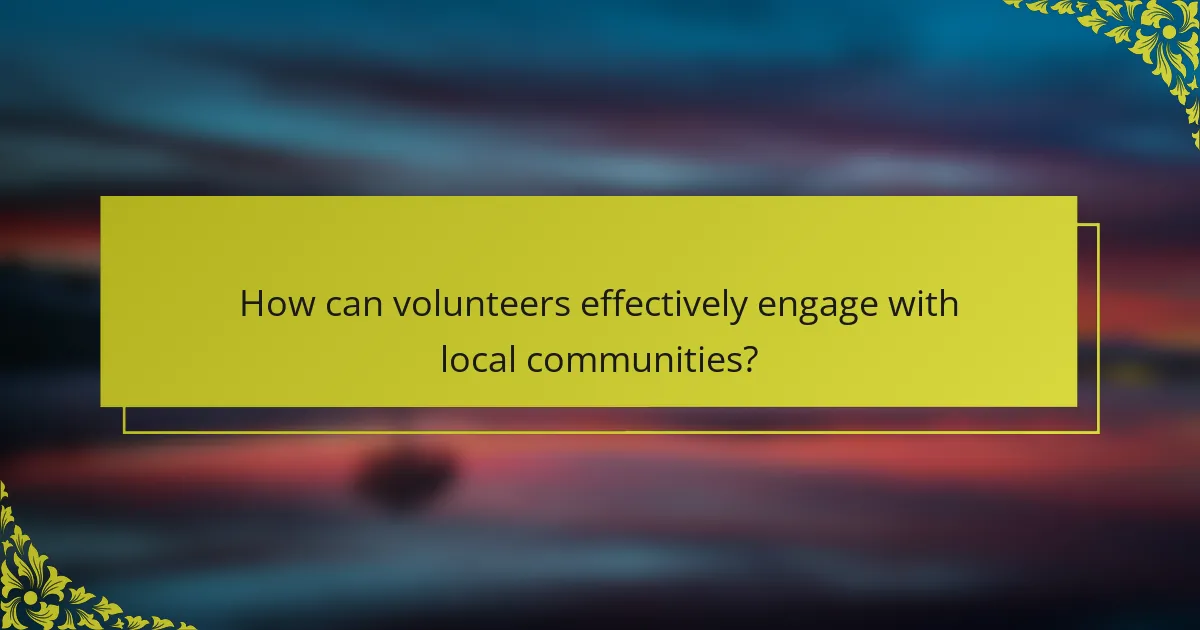
How can volunteers effectively engage with local communities?
Volunteers can effectively engage with local communities in South Africa by prioritizing relationship-building and understanding local needs. Active listening fosters trust and collaboration.
1. Research local issues to align efforts with community priorities.
2. Collaborate with local organizations for guidance and support.
3. Participate in community events to build rapport and visibility.
4. Offer skills-based volunteering to meet specific community needs.
5. Encourage feedback to adapt initiatives for better impact.
6. Share success stories to inspire further involvement.
What cultural considerations should volunteers be aware of?
Volunteers in South Africa should respect local customs, traditions, and social norms. Understanding cultural diversity is essential for effective engagement.
Awareness of language differences can enhance communication with community members. Additionally, recognizing historical contexts can foster deeper connections.
Volunteers should approach cultural practices with sensitivity and openness. Engaging in community activities can provide valuable insights into local life.
Ultimately, cultural competence enhances the volunteer experience and positively impacts the communities served.
How can volunteers contribute to community empowerment?
Volunteers contribute to community empowerment by providing skills, resources, and support that enhance local development. Their involvement fosters social cohesion and drives sustainable initiatives. For example, volunteer tourism in South Africa enables participants to engage in projects that address education, health, and environmental challenges. As a result, communities experience improved quality of life and increased resilience. Volunteers also bring diverse perspectives, which can stimulate innovation and inspire local leaders.
What are the best practices for building trust with local communities?
Building trust with local communities in volunteer tourism involves consistent engagement, transparency, and mutual respect. Establishing strong relationships starts with understanding community needs and expectations.
One effective practice is to involve community members in the planning and implementation of volunteer projects. This ensures that initiatives align with local priorities and fosters a sense of ownership. Regular communication about project goals and progress builds transparency and accountability.
Another best practice is to provide opportunities for cultural exchange. Engaging volunteers in local customs and traditions enhances understanding and appreciation, which strengthens community ties.
Lastly, recognizing and celebrating local achievements can reinforce trust. Acknowledging the contributions of community members fosters goodwill and encourages ongoing collaboration.
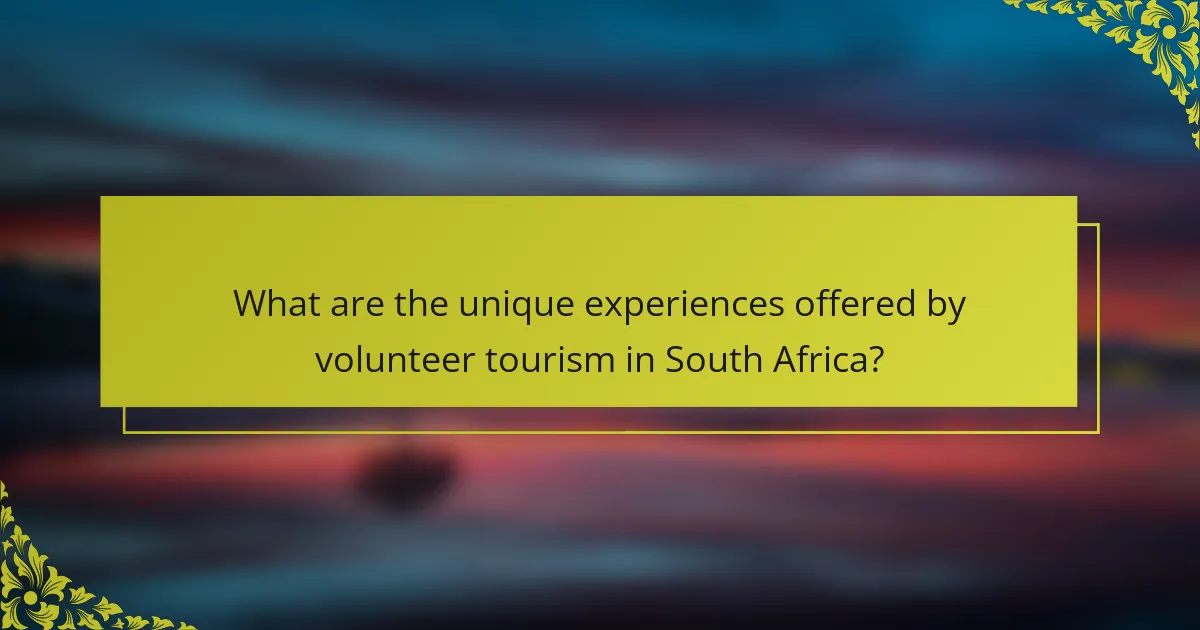
What are the unique experiences offered by volunteer tourism in South Africa?
Volunteer tourism in South Africa offers unique experiences that enhance personal growth and community engagement. Participants can immerse themselves in wildlife conservation, education initiatives, and community development projects.
1. Wildlife conservation programs provide hands-on experience with endangered species, fostering a deeper understanding of biodiversity.
2. Educational initiatives allow volunteers to assist in local schools, promoting literacy and skill development among youth.
3. Community development projects enable volunteers to participate in infrastructure improvement, enhancing living conditions for residents.
4. Cultural exchange experiences offer insight into South African traditions, promoting mutual understanding and respect.
5. Eco-tourism activities combine adventure with conservation efforts, allowing volunteers to explore natural landscapes while contributing to environmental preservation.
How does wildlife conservation volunteering differ from community development volunteering?
Wildlife conservation volunteering focuses on protecting ecosystems and species, while community development volunteering aims to enhance local living conditions. Wildlife projects often involve hands-on activities with animals and habitats, whereas community initiatives prioritize social infrastructure and economic growth. Both types of volunteering contribute positively, but their goals and methods differ significantly.
What are the immersive cultural experiences available to volunteers?
Volunteer tourism in South Africa offers diverse immersive cultural experiences for volunteers. Opportunities include community development projects, wildlife conservation, and educational programs that foster cultural exchange. Volunteers engage with local traditions, participate in festivals, and support artisans, enhancing cultural understanding. These experiences positively impact both volunteers and communities, promoting sustainable tourism and cultural preservation.
Which remote locations provide unique volunteer opportunities?
Remote locations in South Africa offer unique volunteer opportunities in wildlife conservation, community development, and education. Areas like Kruger National Park provide hands-on experiences in animal care and habitat preservation. The Eastern Cape features projects focused on assisting underprivileged communities through education and health initiatives. Coastal regions, such as the Wild Coast, allow volunteers to engage in marine conservation efforts, protecting endangered species and habitats. Each opportunity fosters meaningful community involvement and environmental impact.
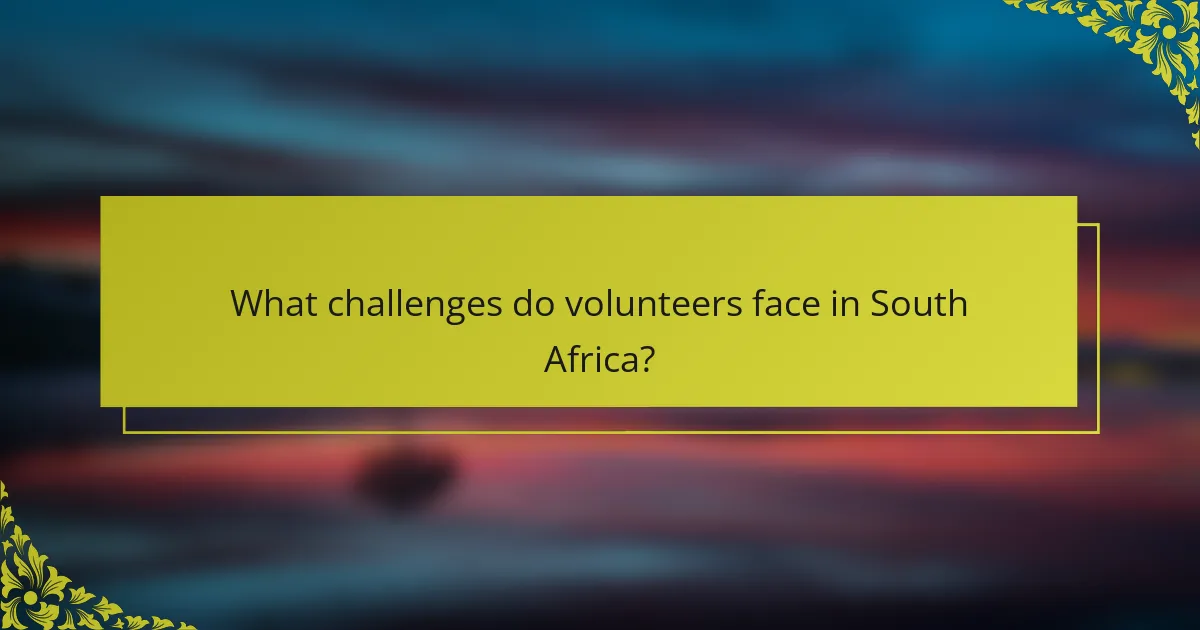
What challenges do volunteers face in South Africa?
Volunteers in South Africa face challenges such as cultural differences, language barriers, and logistical issues. These factors can hinder effective communication and collaboration with local communities. Additionally, volunteers may experience emotional stress due to the socio-economic conditions they encounter. Limited funding and resources can also restrict the impact of volunteer projects. Lastly, safety concerns in certain areas pose risks for volunteers, affecting their overall experience and contribution.
How can volunteers prepare for potential cultural misunderstandings?
Volunteers can prepare for potential cultural misunderstandings by educating themselves about local customs and practices. Understanding cultural norms fosters respect and enhances communication. Active listening and observing local interactions also help in navigating differences. Engaging with community members prior to volunteering builds trust and promotes cultural sensitivity.
What health and safety considerations should volunteers keep in mind?
Volunteers should prioritize health and safety by being aware of local conditions, health risks, and emergency protocols. Understanding these factors enhances their experience and protects their well-being.
1. Research local health risks, such as diseases or environmental hazards.
2. Ensure vaccinations are up to date, particularly for travel-related illnesses.
3. Familiarize yourself with local emergency services and contact information.
4. Carry a first aid kit and know basic first aid procedures.
5. Stay hydrated and practice food safety to avoid illness.
6. Respect local customs and regulations to ensure personal safety.
How can volunteers navigate logistical challenges during their stay?
Volunteers can navigate logistical challenges by planning ahead and utilizing local resources. Effective communication with host organizations ensures clarity on expectations and support. Familiarizing themselves with transportation options and local customs can enhance their experience. Engaging with fellow volunteers can provide valuable insights and solutions to common challenges.
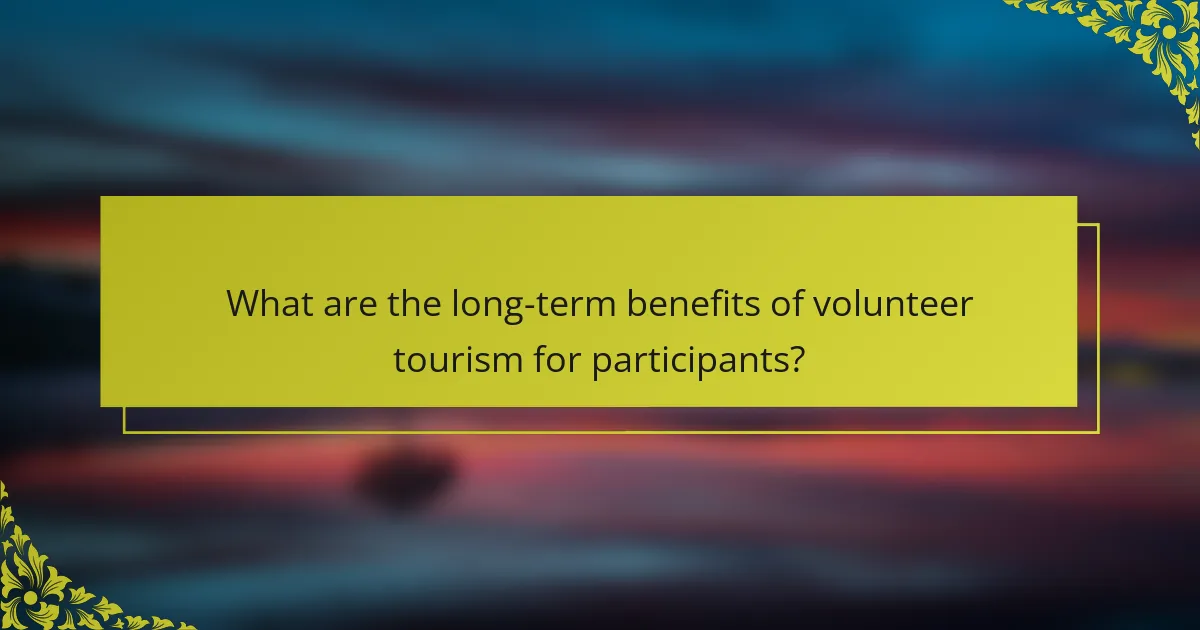
What are the long-term benefits of volunteer tourism for participants?
Volunteer tourism in South Africa provides long-term benefits for participants, including personal growth, cultural understanding, and enhanced skills. Participants often experience increased empathy and a greater sense of global citizenship. Engaging with local communities fosters lasting connections and friendships, enriching participants’ lives. Additionally, volunteer tourism can lead to career opportunities in international development and non-profit sectors, enhancing employability.
How does volunteer tourism enhance personal growth and skills development?
Volunteer tourism significantly enhances personal growth and skills development through immersive experiences and community engagement. Participants gain practical skills, cultural awareness, and emotional intelligence while contributing to local communities in South Africa.
Engaging in volunteer projects fosters adaptability and problem-solving abilities. Volunteers often face new challenges that require innovative solutions, enhancing critical thinking. Furthermore, working alongside diverse groups cultivates teamwork and communication skills, vital in personal and professional contexts.
Research indicates that 70% of volunteers report increased confidence and self-esteem after their experiences. This personal transformation is linked to the sense of purpose and fulfillment derived from making a positive impact.
Additionally, volunteer tourism often includes training programs that equip participants with specific skills, such as teaching, conservation, or healthcare. These unique opportunities not only benefit the community but also enhance the volunteer’s resume and career prospects.
What networking opportunities arise from volunteer tourism?
Volunteer tourism in South Africa offers numerous networking opportunities that can enhance personal and professional connections. Participants can engage with local communities, fellow volunteers, and organizations, fostering relationships that often lead to collaborative projects.
These interactions can result in valuable partnerships, mentorship opportunities, and the exchange of skills. For instance, volunteers may connect with local leaders, gaining insights into community needs and sustainable practices. As a result, these networks can extend beyond the volunteering period, creating lasting impacts on both the individual and the community.
Additionally, volunteer tourism often attracts individuals from diverse backgrounds, enriching the networking experience. This diversity can lead to innovative ideas and solutions, benefiting both volunteers and local initiatives.
How do volunteers maintain connections with communities after their experience?
Volunteers maintain connections with communities through ongoing communication, support, and collaboration. They often use social media platforms to share experiences and updates. Regular visits can strengthen these ties, fostering mutual understanding. Participating in local events or initiatives allows volunteers to remain engaged, enhancing community relationships.
What are the common mistakes to avoid in volunteer tourism?
Common mistakes in volunteer tourism include lack of research, insufficient cultural sensitivity, and neglecting community needs. Many volunteers fail to understand the local context, leading to ineffective projects. Additionally, not establishing clear communication with local organizations can diminish impact. Lastly, overlooking personal safety can pose serious risks.
